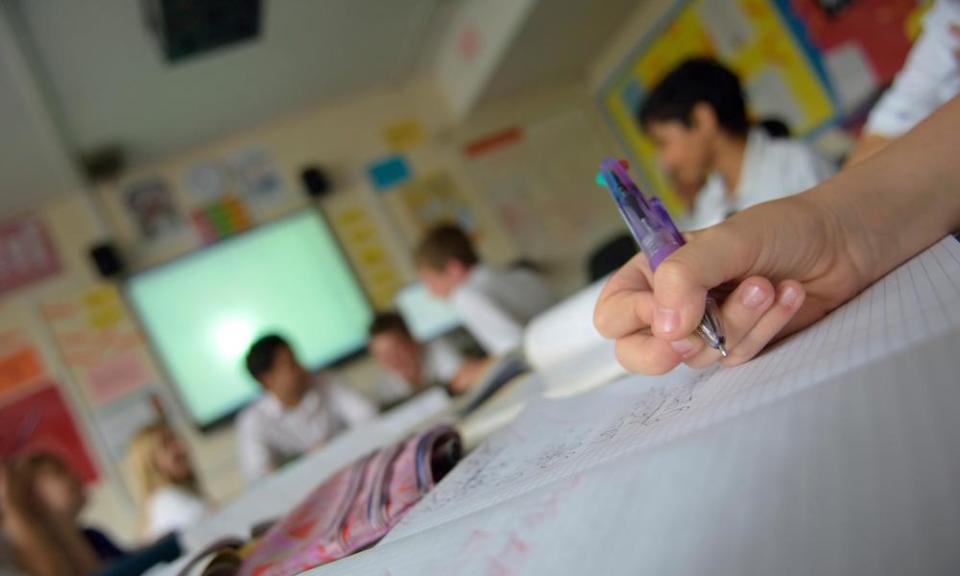English schools not expected to start fully reopening until at least March

Schools in England are not expected to start fully reopening until at least early March, Downing Street has indicated, as Tory MPs and children’s advocates pressurised Boris Johnson to set out a timetable for the process.
The government has promised to reassess lockdown measures on 15 February, and Johnson’s spokesperson said this would be the point at which the evidence would be examined to see if any easing could take place.
The spokesperson also reaffirmed Gavin Williamson’s pledge to give schools at least two weeks’ notice of reopening, meaning it would be March before the process could begin.
The comments came after the prime minister said he would examine “the potential of relaxing some measures” connected to lockdown once the top four categories of vulnerable adults had had their first Covid-19 vaccination, due to happen by mid-February.
“It has always been our intention to ease restrictions when we can from that point on the 15th, and schools are obviously our top priority,” Johnson’s spokesperson said. “We will undertake the review on the 15th. Then we will set out what happens post the 15th.”
Asked whether the two-week notice period was confirmed, he said: “You’ve got what Gavin Williamson said yesterday about ensuring we give a two-week heads-up before we can open schools.”
Earlier on Monday, the 70-strong Covid Recovery Group (CRG) of Conservative MPs said ministers must set out a timetable for the process.
The children’s commissioner for England, Anne Longfield, said that while she accepted that the high coronavirus infection rates made reopening schools difficult, more clarity was needed and there seemed to be a “slight sense of defeatism” over the issue.
On Sunday the health secretary, Matt Hancock, refused to commit to either mid-February, after the half-term break, or after Easter as a point for schools to reopen fully.
Mark Harper, the former chief whip who now chairs the CRG, reiterated the group’s call for reopening efforts to begin three weeks after the top four priority groups for the coronavirus vaccine have received their first dose.
“It seems to us [that] at that point you need to start bringing the economy back to life, and the first thing that needs to be reopened are our schools,” Harper told BBC Radio 4’s Today programme. “All we’re asking for at this point is for the government to set out that sort of plan, based on milestones, based on evidence, so that school leaders, parents, children, have some hope and know what to expect.”
Harper said the government could expect dissent from MPs if it did not take this action. “Set that plan out, and enable us to debate that plan in parliament. I would love the government to set a plan out. I’m not trying to second-guess the government. But if the government doesn’t come forward with a plan, it can’t be surprised if other people will fill the vacuum.”
Robert Halfon, who chairs the Commons education select committee and has been an influential voice on the issue, said urgent action was needed.
He told Times Radio: “We need to get our teachers and support staff vaccinated. That will make a big difference. But I’m hugely worried about the impact on mental health, on educational attainment, on safeguarding, the longer we keep our schools closed.”
Longfield said the long and repeated closures of schools since March had brought about a huge rise in mental health issues among children, with one in six now experiencing problems, and had also widened attainment gaps.
“We’re looking at children with sleep disruption, who have lost the ability to cope, who are fearful about their future,” she told Today. “This is a very serious issue for those children, and for their families.”
She said families “will need hope and clarity about what comes next”, and she called for a robust Covid testing system for schools, and the possible use of vaccinations.
“There is a sort of slight sense of defeatism in the air,” she said of the government’s attitude, arguing that unions and local councils meanwhile believed they could get at least some classes back before too long.
“It can be done, and I think that’s what parents need to know now,” she said. “I would like a slide on every No 10 briefing to show progress back to school, to keep parents and children informed.”

 Yahoo Finance
Yahoo Finance 